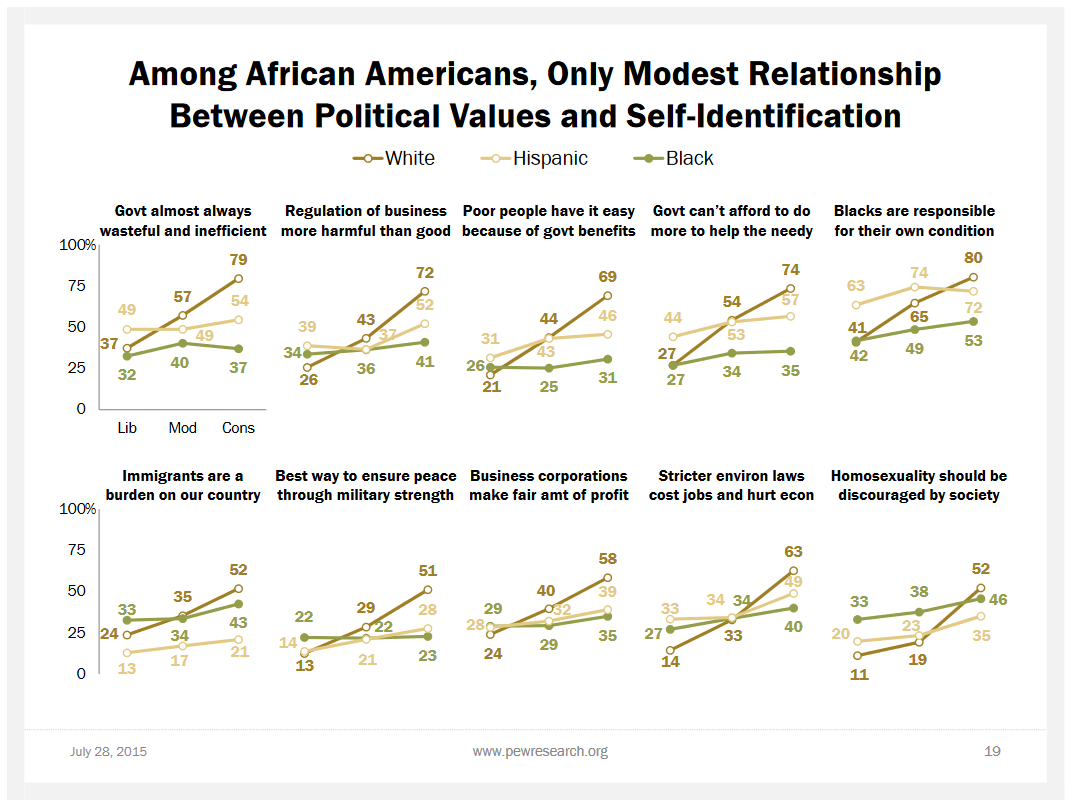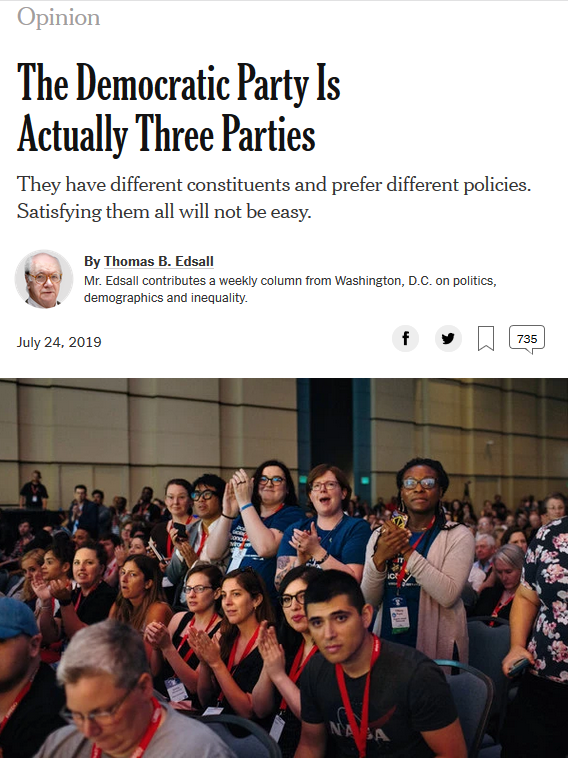 |
What Do Black Voters Want? NYT’s Edsall Says It’s What ‘Conservative’ Democrats Want
view post on FAIR.org
by Jim Naureckas
 “The Democratic Party,” a new column by Thomas Edsall (7/24/19) declares, “Is Actually Three Parties.” “The Democratic Party,” a new column by Thomas Edsall (7/24/19) declares, “Is Actually Three Parties.”
Fascinating! Tell us more, New York Times columnist on “politics, demographics and inequality.”
Well, based on data from a CBS poll of “battleground states,” there are “three roughly equal groups”: Democrats who call themselves “very liberal,” Democrats who call themselves “somewhat liberal,” and Democrats who call themselves “moderate” or “conservative.”
That’s it—those are the “three parties” that the Democratic Party actually is. Such are the striking insights that come with your New York Times subscription. (I would link to the polling data that Edsall is citing, but 12 hours after it was posted, the piece was still pointing to a broken url.)
Now, self-identification as “liberal” or “conservative” doesn’t mean a whole lot. When the Pew Research Center (7/28/15) compared the labels that people picked for themselves with the answers to policy questions with clear right/left options, it found that 56 percent of self-identified “moderates” picked mostly liberal policies, as did 30 percent of “conservatives” and 21 percent of those who said they were “very conservative.”
Notably, Pew found that self-identification is particularly unhelpful in gauging the policy preferences of African Americans; for example, 32 percent of black “liberals” say that “government is almost always wasteful and inefficient,” as do 40 percent of black “moderates” and 37 percent of black “conservatives.” (The corresponding numbers for whites are 37, 57 and 79 percent.) Thirty-two percent of African Americans say that they are “conservative” or “very conservative”; by policy preferences, 3 percent of them are.

The views of self-identified white “conservatives” have little in common with the views of black “conservatives,” which more closely resemble the views of black and white “liberals” (Pew, 7/28/15).
Given that white and black voters seem to have quite different ideas of what “liberal” and “conservative” mean, it is utterly unhelpful to sort voters by self-identification, look at which of these groups has proportionately more people of color, and then generalize from that about what black voters want. But that’s precisely what Edsall does in his analysis of the “three parties”:
The first two groups are made up of those who say they are “very liberal” and those who say they are “somewhat liberal.” Both groups are two-thirds white and have substantial—but for the Democratic Party below average—minority representation. They are roughly a quarter African-American and Hispanic.
Those in the third group are Democratic primary voters who describe themselves as moderate to conservative. This group has the largest number of minorities; it is 26 percent black, 19 percent Hispanic, 7 percent other nonwhites, and it has the smallest percentage of whites, at 48 percent….
The three ideological groups favor different sets of policies. On the left, the very liberal voters stress “the environment, protecting immigrants, abortion and race/gender,”…while the moderate to conservative Democrats are “more concerned with job creation and lowering taxes.”…
What the data demonstrates is that the group containing the largest proportion of minority voters is the most skeptical of some of the most progressive policies embraced by Democratic candidates like Elizabeth Warren, Bernie Sanders and Kamala Harris.

What Thomas Edsall (New York Times, 7/24/19) finds “particularly significant” is data that “weakens the case that mobilization of minorities requires advocacy of very liberal policies across the board.”
The upshot, which Edsall spells out in the first paragraph of his piece, is that it’s “disproportionately white” voters who are “supportive of contentious policies on immigration, healthcare and other issues,” whereas the Democrats’
more moderate wing, which is pressing bread-and-butter concerns like jobs, taxes and a less totalizing vision of health care reform, is majority nonwhite, with almost half of its support coming from African-American and Hispanic voters.
Edsall is playing a shell game here—lumping self-identified black and white “moderates” and “conservatives” together, even though they have very different policy preferences, and then using the amalgamated opinion to generalize about what African Americans really want. You can see this clearly in Edsall’s observation: “Sixty-six percent of the very liberal groups want candidates to address ‘race and gender issues,’ compared with 42 percent of the moderates.” The authentically black thing to do, if you’re following Edsall’s line of reasoning, is apparently not to talk about race so much.
Of course, if you want to find out what African-American Democrats think, you need not—and should not—infer this by extrapolating from what self-identified “moderate” and “conservative” Democrats think. Instead, you can—and should—look directly at what African-American Democrats say they think. Edsall quotes from data given to him directly by CBS; he could certainly have gotten the network to break out the numbers based on ethnicity rather than self-identified ideology. That he didn’t do that tells me that those numbers wouldn’t have done what he wanted them to do.
Indeed, there are other people who have asked African Americans what they want. For example, the Black Census Project conducted by the Black Futures Lab surveyed 30,000 African Americans in 2019, and found 90 percent support for the proposition that “government should provide affordable and quality healthcare for all Americans.” It also found 76 percent support for the idea of raising taxes on people making $250,000 or more, 71 percent in favor of raising the minimum wage to $15/hour, and 76 percent endorsing “making college education affordable for any person who wants to attend.”
Funny, when you actually ask African-American voters, they support “some of the most progressive policies embraced by Democratic candidates like Elizabeth Warren, Bernie Sanders and Kamala Harris.” Maybe that’s why Edsall didn’t ask them.
You can send a message to the New York Times at letters@nytimes.com (Twitter:@NYTOpinion). Please remember that respectful communication is the most effective.
Featured image: NBC News depiction (5/28/16) of a Bernie Sanders rally in Atlantic City, New Jersey.
|
|
No comments:
Post a Comment